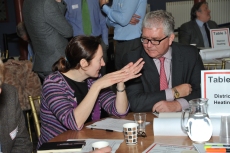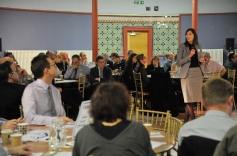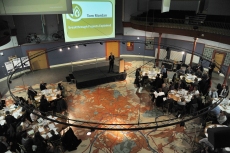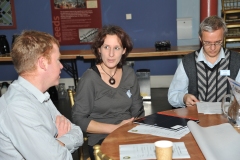Last week, Leeds launched its ambition to become a low carbon city pledging to reduce emissions to become cleaner and greener.
We brought together the residents, businesses and communities to help answer the questions of what can we do to meet the target of reducing Leeds’ emissions by 40% in 2020 and be fully sustainable by the middle of the century. Leeds City Council chief executive Tom Riordan explained why reducing carbon is important for the city and the people of Leeds.
Why is reducing carbon important?
Our guest speakers gave us 3 of the main reasons:
- Healthier communities and families
- Reducing fuel consumption rates as homes and offices become easier and cheaper to heat
- Creating employment growth within the renewable energy sector and attracting new business to a greener city
So how do we get Leeds to become a low carbon city?
To make low carbon a reality, the event discussed 4 areas of focus and came up with some fantastic ideas around who needs to be involved, what the big challenges are and what ideas (both ‘real world’ and the ‘sky’s the limit’) we could use.
1. District Heating (DH) Schemes
A way of providing heating from a single centralised source to a number of homes or offices. Projects currently under way are the Clydes tower blocks in Armley and the new Recycling and Energy Recovery Facility in Cross Green. Conversation highlighted that energy providers and customers are key in all discussion around this work.
Challenges identified were ensuring enough people sign up for DH to make it cost-effective and that the people who need it most, those in fuel poverty, have the chance to be involved.
Ideas to make the scheme work were around securing 100% private finance investment or organising a campaign designed to get people to change their energy consumption habits to use less. In a perfect world this scheme should be available to all the older housing stock (before 1920s) in Leeds.
2. Energy Efficiency
How to insulate, improve boilers and use less energy in both homes and offices. It was decided that government policy makers, private landlords, utility and energy companies should be heavily involved in this work.
Challenges changing the way people use energy, encouraging private landlords to invest in their properties and ensuring the Government have a strong policy on energy efficiency were highlighted.
Ideas organise training for people in how to be more energy efficient and look at introducing a minimum standard for homes and offices. The perfect world idea was to provide local authority funding and target communities where properties are of a poorer standard or energy consumption is high.
3. Solar Panels
Ways of gaining renewable energy, like solar panels, can be installed on most buildings. Conversation highlighted that large-scale business and volume housebuilders need to be involved to use this technology as standard.
 Challenges such as how do we store the energy, through to finding the funding and having a strong legislative framework to make this happen, were discussed.
Challenges such as how do we store the energy, through to finding the funding and having a strong legislative framework to make this happen, were discussed.
Ideas around low costs solutions were aimed at training and education to make businesses and residents aware of the benefits. The sky’s the limit idea was to incentivise, or penalise, people through business rates and council tax.
4. Ultra energy efficient new homes
Leeds has a target to build 70,000 new homes over the next 15 years. How can these homes be ultra-energy efficient from the way they’re built to how they are lived in. Discussion advised that large-scale developers, NHS, Planners and the Homes and Community Agency should be involved.
Challenges involve helping people understand the longer term social return on investment of making these changes or encouraging more innovative design from architects.
Ideas around installing smart meters in all property lead to the perfect world idea of building in the need for energy efficient and low carbon materials and practices in all procurement and building.
So what’s next?
A heartfelt thank you to all those partners, businesses and residents that attended the session or watched it unfold via Twitter.
Making Leeds sustainable by the middle of the century is a big, challenging ambition but one we think can be achieved with the support of the people and businesses of Leeds.
Focus groups are being organised in the new year to act as a sounding board to build on these ideas and projects that we all think can make Low Carbon Leeds a reality. Share this, comment on it or email us at LowCarbonLeeds@leeds.gov.uk
This is a big opportunity for Leeds.
Go on.
Be a Part of It.
